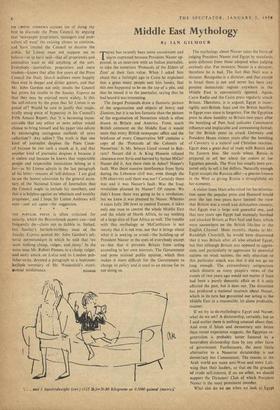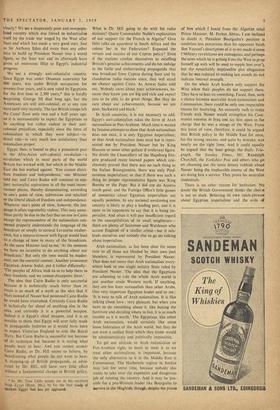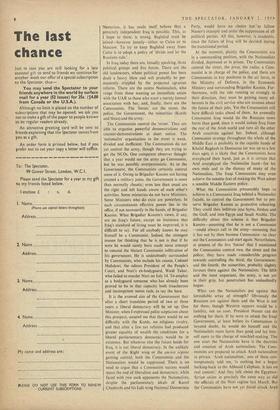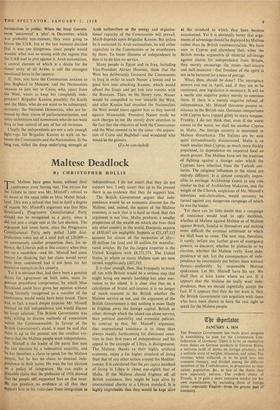Middle East Mythology
By IAN GILMOUR MHERE has recently been some amusement and I alarm expressed because President Nasser ap- peared, in an interview with an Indian journalist, to take the notorious 'Protocols of the Elders of Zion' at their face value. When I asked him about this a fortnight ago in Cairo he explained that a great many people sent him books, that this one happened to be on the top of a pile, and thatâ˘he tossed it to the journalist, saying that he had heard it was interesting.
The forged Protocols draw a fantastic picture of the organisation and objects of Jewry and Zionism, but it is no less fantastic than the picture of the organisation of Nasserism which is often drawn in Britain and America. From much British comment on the Middle East it would seem that every British newspaper office and the briefcase of every Conservative MP contains a copy of the 'Protocols of the Colonels of Nasserism.' Is Mr. Selwyn Lloyd stoned in Bah- rain? Nasser did it. Is King Hussein refused clearance over Syria and harried by Syrian MiGs? Nasser did it. Are there riots in Aden? Nasser's fault. Was there massive interference from Syria during the Lebanese civil war, even though the UN observers said there was not? Certainly there was and it was Nasser's fault. Was the Iraqi revolution planned by Nasser? Of course. We didn't know there was going to be a revolution, but we knew it was planned by Nasser. Whereas it takes fully 200 Jews to control Europe, it takes only one man to control the whole Middle East and the whole of North Africa, to say nothing of a large slice of East Africa as well. The trouble with this mythology or McCarthyism is not merely that it is not true, nor that it brings about what it is seeking to avoidâthe building-up of President Nasser in the eyes of everybody except usâbut that it prevents Britain from acting according to her own interests. The Government and press mislead public opinion, which then makes it more difficult for the Government to change its policy and is used as an excuse for its not doing so.
. . and 1 hundredweight (cwt.) (112' lb.)=50.80 kilograms or 0.5080 quintal (metric).'
The mythology about Nasser takes the form of judging President Nasser and Egypt by standards quite different from those adopted when judging anybody else. For instance, Nasser is a dictator; therefore he is bad. The fact that Nuri was a dictator, Bourguiba is a dictator, and that except in Israel there is not and never has been any genuine democratic regime anywhere in the Middle East is conveniently ignored. Again, Cairo Radio and the Cairo press regularly attack Britain. Therefore, it is argued, Egypt is incor- rigibly anti-British. Suez and the British hostility to Egypt ever since is forgotten. For the Egyptian press to show hostility to Britain two years after the bombing of Port Said indicates Communist influence and implacable and unreasoning hatred; for the British press to attack Germany and President Heuss sixteen years after the bombing of Coventry is a natural and Christian reaction. Egypt does a great deal of trade with Russia and the Eastern bloc. She needs wheat. Russia is prepared to sell her wheat for cotton or for Egyptian pounds. The West has usually been pre- pared only to sell it for dollars. Naturally enough Egypt accepts the Russian offerâa process known in the West as giving Russia a stranglehold on her economy.
A visitor from Mars who relied for his informa- tion upon the popular press and Hansard would over the last two years have formed the view that Britain was a small and defenceless country, that Egypt was a large and powerful one, and that two years ago Egypt had wantonly bombed and attacked Britain at Port Said and Suez, which were somewhere on the British life-line in the English Channel. More recently, thanks to Mr. Randolph Churchill, he would have discovered that it was Britain after all who attacked Egypt, but that although Britain was opposed to aggres- sion, and particularly to aggression by powerful nations on weak nations, the only objection to this particular attack was that it did not go on long enough. The extraordinary astigmatism which distorts so many people's views of the events of two years ago would not matter if Suez had been a purely domestic affair or if it only affected the past, but it does not. The distortion has produced a national neurosis about Nasser, which in its turn has prevented our acting in the Middle East in a reasonable, let alone profitable, manner.
If we try to de-mythologise Egypt and Nasser, what do we see? A dictatorship, certainly, but as I said earlier there is nothing unusual about that. And even if Islam and democracy mix better than recent experience suggests, the Egyptian re- generation is probably better fostered by a benevolent dictatorship than by any other form of government. Furthermore, the most likely alternative to a Nasserist dictatorship is not democracy but Communism. The masses in the Arab world are more anti-West and more Left- wing than their leaders, so that on the grounds of crude self-interest, if on no other, we should support the Dictators' Club of which President Nasser is the most prominent member.
What else do we see when we look at Egypt clearly? We see a desperately poor and overpopu- lated country which was forced to industrialise itself by the trade war waged by the West after Suez and which has made a very good start. Just as Sir Anthony Eden did more than any other man to build up President Nasser into a world figure, so the Suez war and its aftermath have given an enormous fillip to Egypt's industrial progress.
We see a strongly anti-colonialist country. Since Egypt was under Ottoman suzerainty for 400 years, was under British occupation for seventy-four years, and is now ruled by Egyptians for the first time in 2,300 years,* this is hardly surprising. George III died long ago, but the Americans are still anti-colonial, or at any rate were until very recently. The last British troops left the Canal Zone only two and a half years ago, so it is unreasonable to expect the Egyptians to be anything but rather violent in their anti- colonial prejudices, especially since the form of colonialism to which they were subjectâin- direct ruleâis very much less satisfactory than colonialism proper.
Egypt, then, is bound to play a prominent part in the Afro-Asian anti-colonial revolutionâa revolution which in most parts of the world Britain has worked with, but which in the Middle East she has worked against. 'You cannot distri- bute freedom and independence,' one Minister told me; and Cairo Radio will continue to sup- port nationalist aspirations in all the most incon- venient places, thereby disseminating, according to one's point of view, subversion and mischief or the liberal ideals of freedom and independence. Whatever one's point of view, however, the lan- guage is often regrettably violent. This may some- times partly be due to the fact that no one in Cairo except the representative of the nationalism con- cerned properly understands the language of the broadcast or simply to natural Levantine exuber- ance, but a rapprochement with Egypt would lead to a change of tone in many of the broadcasts. As the same Minister said to me, 'At the moment We have no incentive to do anything about our broadcasts.' But only the tone would be moder- ated, not the essential content. Another prominent Egyptian, Anwar Sadat, put it rather differently : The peoples of Africa look to us to help them to their freedom, and we cannot disappoint them.'
The idea that Cairo Radio is only successful because it is technically much better than its rivals is as much of a myth as the idea that if Nuri instead of Nasser had possessed Cairo Radio he would have triumphed. Certainly Cairo Radio is technically far ahead of anything else in the area, and certainly it is a powerful weapon.
Indeed it is Egypt's chief weapon, and it is as
sensible to think that Egypt will ever fully mask Its propaganda batteries as it would have been
to expect Victorian England to sink the Royal Navy. But Cairo Radio is successful not because of its technique but because it is saying what People want to hear. And you cannot answer Cairo Radio, as Dr. Hill seems to believe, by broadcasting what people do not want to hear.
A stepping-up of British propaganda, as advo- cated by Dr. Hill, will have very little effect Without a fundamental change in British policy.
* As Mr. Tom Little points out in his excellent book Egypt (Henn, 30s.), by far the best study of modern Egypt that has yet appeared. What is Dr. Hill going to do with his radio stations? Quote Commander Noble's explanation of our support for the French in Algeria? Give little talks on apartheid in South Africa and the colour bar in the Federation? Expound the virtues and success of our Cyprus policy? Even if the stations confine themselves to extolling Britain's genuine achievements and do not indulge in the futile and embarrassing propaganda that was broadcast from Cyprus during Suez and by clandestine radio stations since, they will stand no chance against Cairo. As Anwat Sadat told me, 'Nobody cares about your achievements, be- cause they know you are big and rich and expect you to be able to do great things. But they do care about our achievements, because we are poor, backward and black.'
In Arab countries, it is not necessary to add, Egypt's anti-colonialism takes the form of Arab nationalism or Pan-Arabism. Much time is wasted by fatuous attempts to show that Arab nationalism does not exist, it is only Egyptian imperialism; or that Arab nationalism does exist but is repre- sented not by President Nasser but by King Hussein or some other gallant if irrelevant figure. No doubt the Chancellery of the Hapsburg Em- pire produced many learned papers which con- clusively proved that there was no such thing as the Italian Risorgimento, there was only Pied- montese imperialism; or that if there was such a thing its proper representative figure was King Bomba or the Pope. But it did not do Austria much good; and the Foreign Office's little games of semantics about Egyptian imperialism are equally pointless. In any national awakening one country is likely to play a leading part, and it is open to its opponents to say that it is being im- perialist. And often it will pay insufficient regard to the susceptibilities of its small neighboursâ there are plenty of Scotsmen and Welshmen who accuse England of a similar crimeâbut it mis- leads ourselves and nobody else to go on talking about imperialism.
Arab nationalism, as has been clear for some time to all those not blinded by their own past blunders, is represented by President Nasser. That does not mean that Arab nationalists every- where look to one single unitary State ruled by President Nasser. The idea that the Egyptians are scheming to .rule the whole Arab world is just another crude Western myth. If anything, they are less keen nationalists than other Arabs. One very important Egyptian leader said to me: 'It is easy to talk of Arab nationalism. It is like talking about love: very pleasant, but when you have to do something about it, like buying the furniture and deciding where to live, it is as much trouble as it is worth.' The Egyptians, like other Arab nationalists, would certainly like some loose federation of the Arab world, but they do not want a unified State which they know would be administratively and politically impossible.
To get our attitude to Arab nationalism or Pan-Arabism right, to learn to treat it as we treat other nationalisms, is important, because the only alternative to it in the Middle East is Communism. The Hashemite regime in Jordan may last for some time, because nobody else wants to take over the expensive and dangerous job of running the country. And it may be pos- sible for a pro-Western leader like Bourguiba to survive in the Maghreb, though, despite the praise
of him which I heard from the Algerian rebel Prime Minister, M. Ferhat Abbas, I am inclined to doubt it. President Bourguiba's position is doubtless less precarious than his opponent Salah Ben Youssef's description of it to me made it seem ('Military revolutions are contagious, and perhaps the arms which he is getting from the West to prop himself up with will be used to topple him over'), but the remarkably implausible plot allegations that he was reduced to making last month do not indicate internal strength.
On the whole Arab leaders only support the West when their peoples do not support them. They have to lean on something. Faced, then, with a choice between neutralist Arab nationalism and Communism, there could be only one respectable reason. for hesitating. Art unseemly rush to make friends with Nasser would strengthen his Com- munist enemies in Iraq and lay him open to the charge that he was a stooge of the West. From this point of view, therefore, it could be argued that British policy in the Middle East for once, for the wrong reasons. and quite by mistake, was nearly on the right litres. And it could equally be argued that the Suez group, the Daily Tele- graph, the Sunday Times, Mr. Randolph Churchill, the Yorkshire Pow and others who go on churning out the same dreary rubbish about Nasser being the implacable enemy of the West are doing him a service. They prove his neutralist credentials.
There is no other reason' for hesitation. No doubt the British Government thinks the choice is not so stark. Believing its own catch-phrases about Egyptian imperialism and the evils of
Nasserism, it has made itself believe that a genuinely independent Iraq is possible. This, as I hope to show, is wrong. Baghdad must be joinedâhowever looselyâeither to Cairo or to Moscow. To try to keep Baghdad away from Cairo is to adopt a policy of 'divide and let the Russians rule.'
In Iraq today there are, broadly speaking, three political groups and five forces. There are the old landowners, whose political power has been dealt a heavy blow and will probably be per- manently crippled by the projected agrarian reform. There are the centre Nationalists, who range from those wanting an immediate union with the UAR to those who want a merely formal association with her; and, finally, there are the Communists. The 'forces' are the street, the police, the Government, the minorities (Kurds and Shias) and the army.
The Communists control the 'street.' They are able to organise powerful demonstrations and counter-demonstrations at short notice. The 'nationalist' organisation in the street is weak, divided and inefficient. The Communists do not yet control the army, though they are trying to get the NCOs. One competent observer thought that a year would see the army go Communist, but he was possibly overpessimistic. As to the Government, the Communists certainly control some of it. Owing to Brigadier Kassim not having created a military junta, the Government is more than normally chaotic; even less than usual are the right and left hands aware of each other's activities. Some ministries do not have Ministers. Some Ministers who do exist are poWerless. In such circumstances effective power lies in the office, if not necessarily in the hands, of Brigadier Kassim. What Brigadier Kassim's views, if any, are on Iraq's future, except an insistence that Iraq's standard of living must be improved, it is difficult to sap. For all anybody knows he may himself be a Communist. Indeed, the strongest reason for thinking that he is not is that if he were he would surely have made some attempt to conceal the blatant Communist infiltration of his government. He is undoubtedly surrounded by Communists, who include his cousin, Colonel Mandawi, the odious President of the People's Court, and Nuri's ex-bodyguard, Wasfi Tahar, who failed to murder Nuri on July 14. To employ as a bodyguard someone who has already been proved to be in that capacity both treacherous and incompetent seems rash, to say the least.
It is the avowed aim of the Government that after a short transition period of two or three years a liberal democracy will be set up. One Minister, when I expressed polite scepticism about this prospect, assured me that there would be no difficulty with the Kurds, no religious rivalry, and that after a few tax reforms had produced greater equality of wealth the conditions for a liberal parliamentary democracy would be in existence. But whatever else the future holds for Iraq, it is not liberal democracy. In the unlikely event of the Right wing or the aticien regime gaining control, both the Communists and the Nationalists would be suppressed. There is no need to argue that a Communist success would mean the end of liberalism and democracy, while faced with two such opponents the Nationalists, despite the parliamentary ideals of Kamil Chaderchi and his Left-wing National Democratic Party, would have no choice but to follow Nasser's example and order the suppression of all political parties. All this, however, is academic, since the future of Iraq will be decided during the transitional period.
At the moment, plainly the Communists are in a commanding position, with the Nationalists divided, depressed or in prison. The Communists control the street, the press, the radio; a Com- munist is in charge of the police, and there are Communists in key positions in the air force, in the Ministry of Defence, in the Economic Ministry and surrounding Brigadier Kassim. Fur- thermore, with the tide running so strongly in their direction, they must be gaining many acI7 herents in the civil service who are anxious about the future of their jobs. Yet the Communists still have difficult tasks ahead of them. An avowedly Communist Iraq would do the Russians more harm than good, since it would isolate Iraq from the rest of the Arab world and turn all the other Arab countries against her. Indeed, although Communist strategy throughout the whole of the Middle East is probably in the capable hands of Khalid Bagdash in Damascus (or was up to a few days ago), it is likely that the Communists have overplayed their hand, just as it is certain that Aref overplayed the Nationalist handâfor his own ends and to the dismay of many of the Nationalists. The Iraqi Communists may even achieve the notable feat of making the West adopt a sensible Middle Eastern policy.
What the Communists presumably hope to achieve is a Communist Iraq behind a Nationalist façade, to control the Government but to pre- serve Brigadier Kassim as protective colouring. They could then infiltrate into Syria, Jordan and the Gulf, and into Egypt and Saudi Arabia. The difficulty about this scheme is that Brigadier Kassimâassuming that he is not a Communist âcould always call in the armyâassuming that it has not by then become Communistâto clear out the Communists and start again. Nevertheless, at present of the five 'forces' that I mentioned the Communists control two, the street and the police; they have made considerable progress towards controlling the third, the Government; and the fourth, the minorities, probably slightly favours them against the Nationalists. The fifth and the most important, the army, is not yet in their grip, but penetration has undoubtedly begun.
What can the Nationalists put against this formidable array of strength? Obviously the Russians are against them and the West is not for them, though Western support would be a liability, not an asset. President Nasser can do nothing for them. If he were to attack the Iraqi Government, at least before its Communism is beyond doubt, he would do himself and the Nationalists more harm than good and lay him- self open to the charge of mischief-making. The one asset the Nationalists have is the doctrine and emotion of Arab nationalism. The Corn.
munists are prepared to attack Arab nationalism in private. 'Arab nationalism,' one of them con⢠temptuously told me, 'is nothing but a bogus harking-back to the Abbasid Caliphate. It has no real content.' And they talk about the Egyptian Syrian union in precisely the same way as did the officials of the Nuri regime last March. But the Communists have not yet dared attack Arab nationalism in public. When the Iraqi Govern- ment 'uncovered' a 'plot' in December, which was probably non-existent, they were going to blame the UAR, but at the last moment decided that it was too dangerous, since people would wonder what was so wrong with the regime that the UAR had to plot against it. Arab nationalism, a central element of which is a desire for the closer unity of all Arabs, is still the strongest emotional force in the country.
If, then, you have the Communists anxious to join Baghdad to Moscow, and the Nationalists anxious to join her to Cairo, who, apart from the West, wants to keep her completely inde- pendent? Brigadier Kassim, possibly; the Kurds and the Shias, who do not want to be submerged, certainly; the National Democrats, who are be- mused by their vision of parliamentarianism, and some technicians and economists who do not want Iraq to lose control of any of her oil revenues.
Clearly the independents are not a safe enough tight-rope for Brigadier Kassim to walk on be- tween the Communists and the Nationalists. In the long run, either the deep underlying strength of Arab nationalism or the energy and organisa- tional capacity of the Communists will prevail. Much depends upon Brigadier Kassim. But unless he is sustained by Arab nationalism, he will either capitulate to the Communists or be overthrown by them. To foster illusions of independence in him is to do him no service.
Many people in Egypt and in Iraq, including Vice-President Akram Hourani, think that the West has deliberately favoured the Communists in Iraq in order to teach Nasser a lesson and to goad him into attacking Kassim, which would offend the Iraqis and get him into trouble with the Russians. Then, so the theory runs, Nasser would be compelled to veer towards the West, and after Kassim had smashed the Nationalists the West would move against him as they moved against Moussadek. President Nasser made no such charges to me. He merely drew attention to the fact that the objective of both the Communists and the West seemed to be the sameâthe separa- tion of Cairo and Baghdadâand wondered who would be the gainers.
(To be concluded)













































 Previous page
Previous page